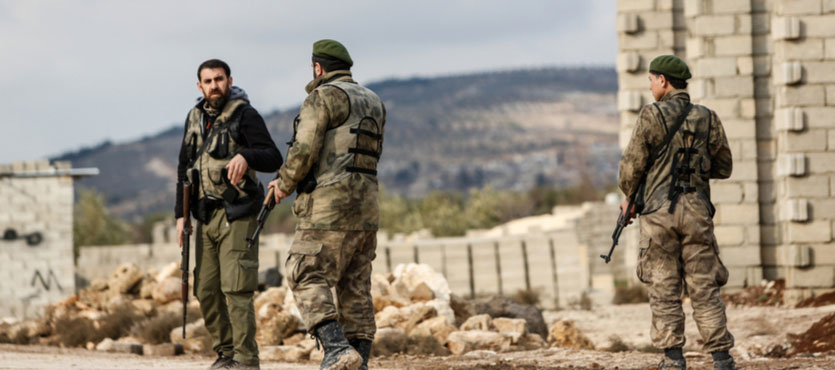5,500 Department of Defense contractors are in Syria and Iraq battling ISIS, according to a quarterly report from the U.S. Central Command.
The report lists two theaters of operations under USCENTCOM’s jurisdiction – Afghanistan and Syria/Iraq. This report is the first time that the Pentagon has said that there are anti-ISIS contractors in both countries. Almost a third are in logistics and maintenance; another third are either interpreters or serve in base support positions. Less than 7% serve in “Security” positions. The report does not offer a breakdown between Iraq and Syria. Altogether, there are more than 11,000 contractors in the theater, including those who work for non-DoD agencies.
Previously, the Labor Department reported that two contractors were killed and six others were injured in Syria during 2017. This latest disclosure comes at a time of uncertainty regarding the American mission in Syria. Some, including President Donald Trump, want to declare victory over ISIS and withdraw. But some military commanders warn that such a withdrawal could allow ISIS elements to re-form and present a continuing danger.
“I would give America a six-month honeymoon here,” remarked Joshua Landis, the director of Middle East Studies at the University of Oklahoma.
Syrian Contractors During “Wartime”
Contractors play a vital political and military role in places like Syria. That has been the case ever since the General Accounting Office approved widespread use of armed contractors in 1978.
Politically, contractor deployment, and more importantly contractor casualties, do not count in official reports. That makes the DoD’s footprint and the risks that its personnel face look smaller. A semi-popular conflict, like the one in Syria, thus becomes easier to sell to civilian brass.
There are other political benefits, as well. For example, contractors keep a low profile in the country. That is often a big advantage because many people in other nations still view Americans as imperialist. Fighting an enemy like ISIS consumes all a soldier’s energy. These individuals should not have to deal with picketers and protesters while they are in-country.
Militarily, private military contractors usually provide security services. If they were not around, the regular army must take people off the front lines to perform these tasks. Moreover, sentry duty, verifying IDs at checkpoints, and escorting supply convoys are not exactly sought-after duties. So, contractors are also good for morale.
Then, there is the long list of contractors who serve in support roles. These individuals give the military commanders additional flexibility. For example, if the Marines need a new barracks, the CO can pick up the phone and have well-qualified contractors start the next week. When the project is done, the contractors are reassigned or sent home. There is no additional overhead or oversight.
Syrian Contractors During “Peacetime”
The Syrian Civil War has dragged on for about a decade, devastating large swaths of the country. Some estimate that it will take about a trillion dollars to rebuild the country. That is a lot of money, but it must be invested. Most refugees will not come back until there are streets, schools, hospitals, utilities, and everything else that many Americans take for granted.
In many rebuilding projects, contractors serve in planning and management roles. Locals do most of the other work. That arrangement serves several purposes. It reduces the number of needed contractors, provides jobs to locals, and gives the community a sense of investment.
That third element is particularly important. A region like Syria is never really “at peace.” Sporadic attacks, like suicide bombers, may go on for years or even longer after the troops leave. So, in addition to construction workers, these projects need security personnel. That means armed and experienced contractors. Once the servicemembers pull out, there is no one left to do the job. Unprotected construction sites invite disaster.
Injury Compensation Available
Whether they wield rifles or hammers, and whatever phase they serve in, private military contractors risk serious injury.
As the fighting rages, there are obviously many dangers. Contractors in the “rear area” risk injury from shellfire, rocket attacks, IEDs, mortar rounds, and all the other lethal hazards of anti-insurgent warfare. In addition to trauma wounds, there is also the risk of Post Traumatic Stress Disorder, a concussion, or another brain injury.
During rebuilding and reconstruction, the safety measures required in the United States may be absent in Syria. That is especially true if the government is just getting back on its feet. OSHA-like inspections are a low priority for startup governments. That means even a greater risk of falls, motor vehicle crashes, and other workplace accidents.
The Defense Base Act provides money for lost wages. Most victims receive two-thirds of their average weekly wage as they recover. This money gives their families an important income stream at the time it is needed most.
The DBA also helps this money go a little further because the insurance benefits also take care of medical bills. That includes all reasonably necessary expenses, from the first minute of emergency care to the last physical therapy session. The DBA lets most victims choose their own doctors.
Documentation is very important in a DBA case. Victims must prove that the injury was job-related and that the medial treatment was reasonable. So, victims must collect as much information as possible, including the names and stateside contact numbers for witnesses. An attorney shoulders much of this responsibility, but the victim’s role is still critical.
For more information regarding a successful DBA case, contact Barnett, Lerner, Karsen & Frankel, P.A.

